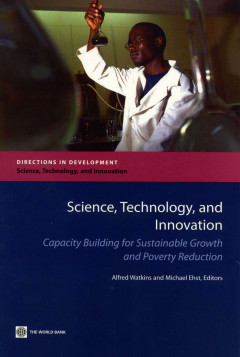Ditapis dengan
Ditemukan 1 dari pencarian Anda melalui kata kunci: subject="Inovasi teknologi –...

Science, technology, and innovation
A strong and dynamic capacity in science, technology, and innovation (STI) can no longer be seen as a luxury that is suitable only for wealthier, more economically powerful countries. Rather, if developing countries hope to prosper in the global economy, and if world leaders expect globalization to foster sustainable development and to reduce poverty, STI capacity building is an absolute necess…
- Edisi
- -
- ISBN/ISSN
- 978-0-8213-7380-4
- Deskripsi Fisik
- xxii,211 hal. : il. ; 23 cm.
- Judul Seri
- -
- No. Panggil
- 338.927.091.724 SCI
 Karya Umum
Karya Umum  Filsafat
Filsafat  Agama
Agama  Ilmu-ilmu Sosial
Ilmu-ilmu Sosial  Bahasa
Bahasa  Ilmu-ilmu Murni
Ilmu-ilmu Murni  Ilmu-ilmu Terapan
Ilmu-ilmu Terapan  Kesenian, Hiburan, dan Olahraga
Kesenian, Hiburan, dan Olahraga  Kesusastraan
Kesusastraan  Geografi dan Sejarah
Geografi dan Sejarah